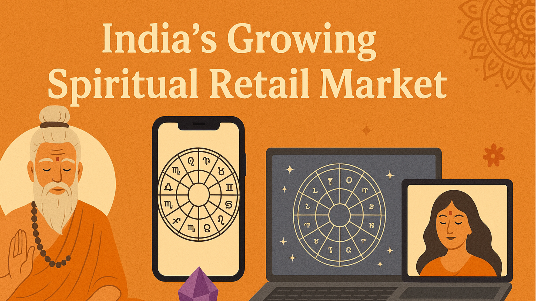What started as digitised content evolved into digitised services, an early precursor of the “platform economy.” AstroYogi connected seekers with reputed astrologers across the country, gradually creating a trusted ecosystem.

Spiritual Retail
In 2001, when India was just beginning to flirt with the internet, the founders of AstroYogi saw something others missed: the possibility of digitising spirituality. While most startups of that era were busy with classifieds, travel, or matrimony, AstroYogi founders’ bet was on a cultural constant; India’s obsession with astrology and spiritual counsel.
“Back then, people would travel long distances to meet an astrologer. Access was fragmented, trust was scattered, and the internet was still this shiny, unfamiliar tool,” Meena Bahl Kapoor, Co-founder, Astroyogi recalls. “AstroYogi began with a simple thought: what if we could bring authentic advice and spiritual content into people’s homes, digitally?”
What started as digitised content evolved into digitised services, an early precursor of the “platform economy.” AstroYogi connected seekers with reputed astrologers across the country, gradually creating a trusted ecosystem. Today, it operates through its website and mobile apps (launched in 2016–17), clocking millions of daily interactions.
But Kapoor didn’t stop at advice. In 2023, she spun out Yogi by AstroYogi, the retail arm that sells everything from crystals to eco-conscious pooja kits. “People often asked me: where can I buy authentic, natural, spiritual products? That’s when I realised the gap, the unorganised sector was thriving, but the consumer was evolving,” she explains.
Numbers tell the larger story. India’s spiritual retail market, pegged at $65 billion in 2024, is projected to more than double to $135 billion by 2033. Astrology alone, Kapoor points out, is a $13 billion segment today, expected to skyrocket to $180 billion by 2030.
Driving this growth are factors far beyond internet penetration. The new buzzwords: conscious consumption, mental wellness, and lifestyle spirituality.
“Spirituality is no longer boxed into religion. Millennials and Gen Z want experiences that connect to their emotional and mental well-being,” Kapoor notes. “They want products that are organic, ethically sourced, certified—and they want to be part of something larger than themselves.”
AstroYogi’s answer? Karma and Destiny, a social-impact layer woven into its retail arm, and a conscious push to empower women artisans across its supply chain.
If the spiritual retail sector has long suffered from credibility concerns, AstroYogi leans on two levers: legacy and certification. Every product comes with a detailed card, certification, and instructions. Every astrologer passes through stringent verification and training, with some even failing the onboarding process.
And behind the mysticism, the company is deeply tech-first. AI now powers operations, efficiency, and customer experience. “We’re not just teaching our team to adopt AI, we’re building an AI-first culture,” Kapoor emphasises.
Interestingly, Kapoor has found believers in the most unlikely places-quick commerce platforms. Crystals and pooja kits are now moving with the same urgency as groceries. AstroYogi has clocked 200% growth every quarter in retail since its e-commerce debut.
Popular products include amethyst for calm, citrine for energy, pyrite for prosperity, and gifting-friendly crystal jewelry. Eco-conscious agarbattis and pooja kits are also driving traction, marking a shift from religion-driven buys to wellness-driven choices.
The next wave, Kapoor predicts, is experiential spirituality. Just as yoga and meditation travelled west, got repackaged, and came back to India with global acceptance, astrology and crystals are entering the lifestyle mainstream.
“Today’s consumer doesn’t just want a stone. They want to know its story, its energy, its impact. They want an experience, not just a product,” she says.
For now, AstroYogi remains an online-first business. But Kapoor hints at the inevitable: Yogi stores are on the “manifestation pipeline.” Offline expansion, she says, is a natural extension of the brand’s growth trajectory.
Financially, the company has kept itself lean and profitable. Having crossed INR 100 crore in FY25 (touching ~₹110 crore), AstroYogi is now eyeing INR 250 crore by 2027-without external funding.
Kapoor’s journey reads like a case study in how cultural continuity, when reimagined with technology, can unlock billion-dollar opportunities. If the last decade was about fitness and mindfulness apps, the coming decade could very well belong to spiritual SaaS, subscription models, personalised AI-powered readings, and immersive offline experiences.
For Kapoor, though, it remains deeply personal. “I’ve been on my own spiritual journey for over 15 years. AstroYogi isn’t just business. It’s about filling a genuine gap, offering authenticity, and making spirituality a conscious part of modern living.”
From dotcom uncertainty to an INR 100-crore reality, AstroYogi’s story feels like it isn’t just about astrology but about foresight.
Empower your business. Get practical tips, market insights, and growth strategies delivered to your inbox
By continuing you agree to our Privacy Policy & Terms & Conditions
